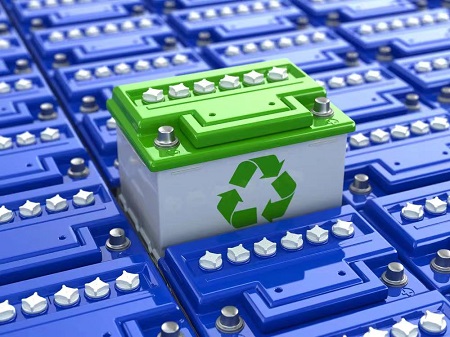In the context of the “dual carbon” goal, the global automotive industry has poured into the new energy track, and solid-state batteries are becoming an important player on this track.
In the first 10 months of this year, China’s new energy vehicle production and sales completed 2.566 million and 2.542 million respectively, a year-on-year increase of 1.8 times.
During the same period, the total installed capacity of domestic power batteries was 107.5 gigawatt hours (GWh), a year-on-year increase of 168.1%.

Power solid battery
Solid state battery
With the growth of the new energy vehicle and power battery market, solid-state batteries with better performance and safety have become a new technology for car companies to rush to deploy. Europe, the United States, Japan and South Korea are all increasing the layout of solid-state power batteries.
They have formulated national strategies, increased government and private investment, and formed cross-industry industrial alliances, aiming to seize the commanding heights in the field of new-generation power batteries.
Dong Yang, vice chairman of the China Electric Vehicles Association, said that the increase in solid-state power battery research in Europe, America, Japan and South Korea is definitely not because the liquid electrolyte lithium-ion battery technology cannot meet the development requirements of new energy vehicles, but because my country has already taken some of the opportunities.
Status of battery industry in China
They hope to recover their disadvantages in the field of next-generation batteries. What is the current status of power battery development in my country?
Europe, the United States, Japan and South Korea take the lead in the layout of the government’s generous support.
In the global competition of solid-state batteries, businesses and governments in Europe, the United States, Japan and South Korea are vigorously supporting solid-state battery technology research and development and industrial layout.
On November 22, the Dutch 3D solid-state battery startup LionVolt announced the completion of a seed round of financing of 4 million euros (approximately RMB 28.74 million). So far, the company’s total financing this year has exceeded 5 million euros.
For the layout of solid-state batteries, European, American, Japanese and Korean companies are paying more and more attention. “Today’s power battery field, market competition is more reflected in technology competition, so is solid-state batteries.
Tomorrow’s share
Among European companies, BMW has recently deepened its cooperation with SolidPower, a solid-state battery company in the United States, and invested another US$130 million in the research and development of solid-state battery technology. For mass production cars.
The Volkswagen Group is also working closely with QuantumScape, a solid-state battery company in the United States, with an investment of US$300 million and plans to mass-produce solid-state batteries in 2025. Daimler has cooperated with Quebec Hydropower in Canada to develop solid-state batteries, and has begun to build Europe’s largest power battery plant in Germany.
Among American car companies, Ford has also invested in SolidPower, an American solid-state battery company, hoping to obtain a stable supply of solid-state batteries.
General Motors’ solid-state battery research and development project received a US$9.1 million grant from the U.S. Department of Energy.
Among Japanese and Korean companies, Toyota has built solid-state batteries with a driving range of more than 1,000 kilometers and can be fully charged in 15 minutes in the laboratory, and they are testing them on concept cars.
Toyota has also established a solid-state battery company in a joint venture with Panasonic. It plans to mass-produce electric vehicles equipped with solid-state batteries in 2025.
Hyundai of South Korea has successively invested in solid-state battery companies SolidPower & SolidEnergySystem (SES) in the United States, and South Korean battery supplier SKI recently invested 30 million US dollars in SolidPower and obtained the right to use SolidPower’s solid-state battery-related technology and production processes.
Government & organizations
Not only enterprises, but also governments and regional organizations have given strong support to solid-state batteries. Foreign governments and institutions also attach great importance to solid-state batteries. In Europe, the German government invested 1 billion euros
Support solid-state battery technology research and development and production, and support the establishment of power battery research and development alliances, focusing on solid-state battery technology development.
At present, including Germany’s Wartamec Battery Company, BASF, Ford Germany, Volkswagen Group, etc. have voluntarily joined this alliance.
The European Union also approved a special plan for solid-state battery investment in Europe, with a joint investment of 3.2 billion euros from multiple EU countries, while raising 5 billion euros from private investors for the development of solid-state batteries.
The U.S. Department of Energy announced in October this year that it would provide $209 million in funding for 26 laboratory projects to develop solid-state batteries and fast charging technologies.
The Japanese government plans to provide hundreds of billions of yen in research and development subsidies for solid-state batteries. The South Korean government has decided to invest 30 billion won in the next five years to support the development of all-solid-state batteries.
Multi-party competition
Attention at the national level is an important booster for the development of technology and industry. Although the current understanding of next-generation batteries is not uniform, Europe and the United States believe that solid-state batteries are the ultimate form of lithium-ion batteries.
Therefore, a number of solid-state battery development plans have been released. Following the EU’s launch of the “Battery 2030 Plan” and “2030 Battery Innovation” After the Roadmap, Finland also recently released the “National Battery Strategy for 2025.”
In June this year, the United States released the “U.S. Lithium Battery 2021-2030 National Blueprint” to make deployments for the development of solid-state batteries.
In Japan’s next-generation battery plan, solid-state batteries and hydrogen fuel cells are used as the starting point to reverse the current Japanese power battery market share. South Korea formulated the “Battery National Strategy,” which clarified the important value of developing solid-state batteries.
These support from policies, funds and other aspects all show that countries attach great importance to the development of solid-state battery competition.



